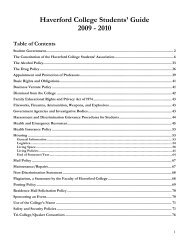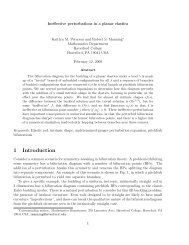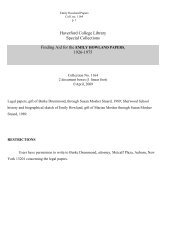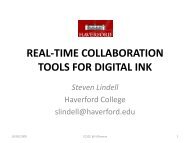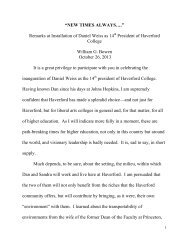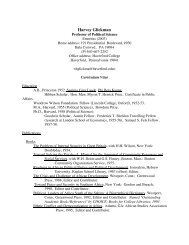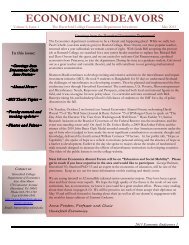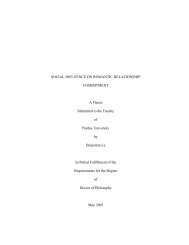Spring 2002 - Haverford College
Spring 2002 - Haverford College
Spring 2002 - Haverford College
Create successful ePaper yourself
Turn your PDF publications into a flip-book with our unique Google optimized e-Paper software.
Jerry Levin<br />
LEVIN I’m not sure I understood the<br />
question.<br />
KALB A kind of hedge fund for beginners<br />
is the way I understood it.<br />
Q. A growing hedge fund, a growing<br />
hedge fund to encourage young artists<br />
who don’t have the kind of, you know…<br />
LEVIN We have several examples. HBO<br />
for example, each year, I’m not even sure<br />
what the amounts are anymore, at some<br />
points they’re up to $25,000 apiece, to<br />
encourage new artists, young people, particularly<br />
with screenplays, that are very<br />
hard to get produced these days. So, we<br />
have various examples around the company.<br />
That’s the most prominent because<br />
I’m very interested in things that come<br />
from that.<br />
Q. I’m a freshman at the George<br />
Washington University. In today’s New<br />
York Times there was an important Op-Ed<br />
that suggests companies like yours need to<br />
be doing more to make broadband<br />
Internet more physically and financially<br />
affordable for the 90 percent of the<br />
population that does not have access.<br />
What is AOL Time Warner’s plan?<br />
LEVIN This is, you know, the common<br />
phrase is the digital divide, and we don’t<br />
want to develop an information aristocracy.<br />
Here’s an example where public policy<br />
and private companies, they’re just not<br />
working together. Time Warner agreed<br />
several years ago with the then-head of<br />
the FCC that in every one of our cable<br />
franchises for a certain amount of rate regulation<br />
relief we would build out particularly<br />
broadband connections to all parts<br />
of our franchise, not just the higher economic<br />
areas, but also that we would serve<br />
schools, libraries, and all public institutions.<br />
We’re just about there. What the<br />
public policy needs to do is to somehow<br />
superimpose on not only the cable companies<br />
but also the telephone companies,<br />
in exchange for probably loosening regulations.<br />
So, this is a case where no one<br />
company can do it, but there is a way of<br />
kind of prodding some of the companies<br />
to continue to do it. It’s a real issue<br />
because, increasingly, broadband capability<br />
and the ability to deliver information<br />
on demand, any kind of information, is<br />
going to represent, kind of, the learning<br />
tool of the future. So we’ve just, my final<br />
answer is there needs to be more public,<br />
private cooperation—that we actually<br />
have the same objective that’s underneath<br />
your question.<br />
Q. I’m a socio-linguist with an interest in<br />
media and I also teach at George<br />
Washington in the anthropology department.<br />
I was interested in your lighter<br />
remarks in which you were saying that<br />
you want to put the poetry back into your<br />
life and you were talking in particular<br />
about your own experience as sort of<br />
knowing too much about things like going<br />
to the movies, so that it was no longer a<br />
sort of poetic experience. And of course,<br />
that made me think of the fact that for<br />
many of us, it’s not that different, because<br />
we see the previews and we read, you<br />
know, the film reviews and a lot of these<br />
things. And, I’m wondering if your own<br />
experience has made you think, in any<br />
way, about what the world of journalism<br />
might be in the future. I believe you said<br />
that you thought a major role was to<br />
understand.<br />
LEVIN Well, I do think there’s a qualitative<br />
difference—getting as much information<br />
out so that people can make their<br />
own judgments about every issue including<br />
lifestyle issues—what movie to go to—<br />
and you know what’s available locally as<br />
well as how to understand the anthrax<br />
threat. But the qualitative difference that<br />
I was describing for myself, by understanding<br />
the construction of a film, understanding<br />
the marketing parameters, it’s<br />
just so, the taxonomy is so detailed, so<br />
sterile that it really doesn’t compare to that<br />
wonderful process of reading reviews and<br />
talking to friends and you know, getting<br />
some kind of assimilation about a particular<br />
work of art. The innards of its construction<br />
and the budget, “Matrix” II and<br />
III are being shot now by the Wachowsky<br />
brothers. It’s the most remarkable kind of<br />
movie making, but it’s all part of a financial<br />
plan that we have. I can visit the set,<br />
but it’s not the same joy I had as a<br />
<strong>Haverford</strong> student when I went to see a<br />
good foreign film.<br />
Q. Do you plan to travel, most specifically<br />
to Israel? Could you be next year in<br />
Jerusalem?<br />
LEVIN I have been traveling quite a bit<br />
lately, not only on behalf of the company,<br />
but recognizing that, in many cases public<br />
policy around the world whether it’s in<br />
China or Germany or elsewhere, involves<br />
a lot of what we do, but also to try and<br />
be helpful. You know, what’s happening<br />
in Israel with the Palestinians is, obviously,<br />
very significant. I’ve had the opportunity<br />
to meet with many of the leaders<br />
in Israel and, no, I don’t think I’ll be playing<br />
a particular role, although I’ll mention<br />
two things to you. First, Shimon<br />
Peres has something called the Peres<br />
Center for Peace and he has joined with<br />
Kofi Annan, a part of the UN that<br />
engages in specific projects, and they<br />
have a notion, an idealistic notion, of<br />
“I would make the outright statement that I think the American Dream has been<br />
held together in many difficult times of peril, you know, whether that was the<br />
Vietnam War, or the McCarthy Era, or the Depression, by the press. I honestly<br />
think and believe that.”<br />
30 <strong>Haverford</strong> Magazine




